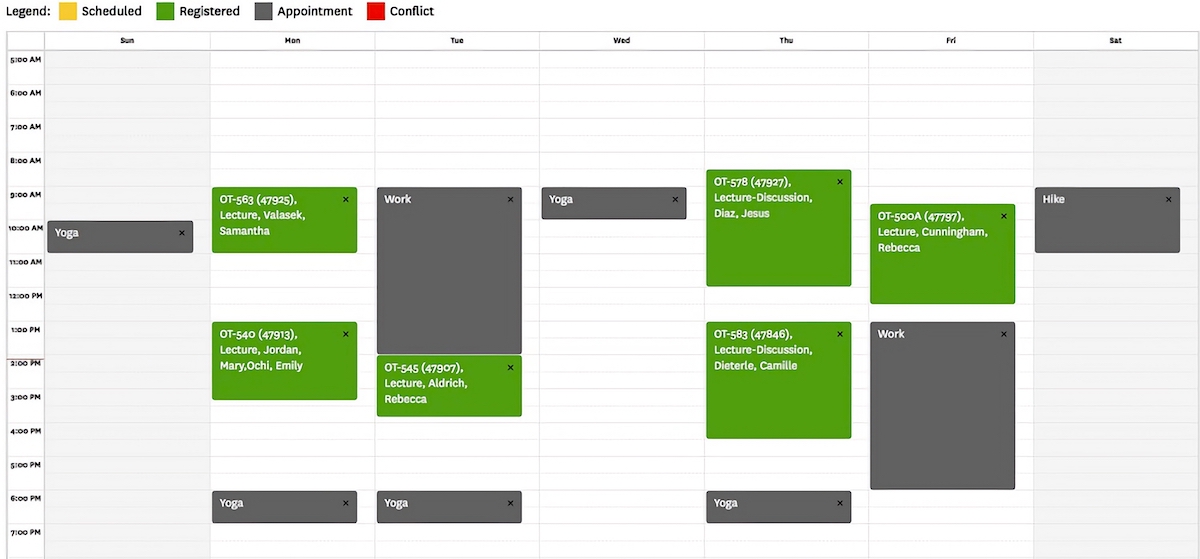Student Blog
Life Hacks
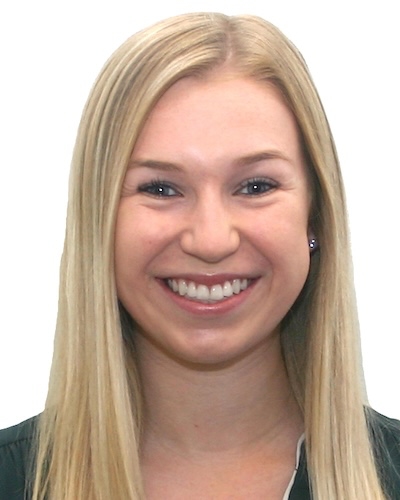
3 Ways to Pursue OT as an Undergrad ⟩
February 4, 2019, by Jessica P.
Admissions Life Hacks
As many of you know, to practice as an occupational therapist in the United States you need a master’s degree. So that leaves a lot of people wondering — how do I get involved as an undergrad to prepare myself to become an occupational therapist? At USC as an undergrad, there are many ways to pursue occupational therapy from the minute you step on campus as a freshman:
1. Major in Occupational Therapy
If you know as a high school student applying to college, you want to pursue occupational therapy as a career then our Bachelor to Master’s (BS-MA) in Occupational Therapy is the major for you! The accelerated BS-MA program is a program where you get your undergrad and master’s degrees in just 5 years, instead of the traditional 6 years. The program follows a 3 + 2 format where your first 3 years you complete your undergrad courses and the last 2 years you complete your master’s courses.

During your undergrad years, you complete pre-professional courses as well as general education courses that all USC students take. Many students wonder if they can still have the “typical” college experience while being in an accelerated program, and let me tell you — you definitely can! As a BS-MA student, I was able to still take courses abroad, pick up a minor, while also participating in Greek life and student organizations.
2. Minor in Occupational Science
If you are an undergrad at USC, but aren’t already majoring in Occupational Therapy, you can join our amazing Occupational Science minor. Occupational Science was founded at USC in 1989. The OS minor classes are designed to complement any major and enhance students’ understanding of occupations, the things we do every day that occupy our time. There are students who are in a variety of majors such as accounting, chemistry, and theater, in addition to students who are planning on pursuing occupational therapy as their career.
There are classes like OT 310: Creativity Workshop where you get to explore your own creativity, OT 340: Occupational Foundations of Human-Animal Interaction which focuses on how animals contribute to human health, OT 350: Disability, Occupations, and the Health Care System where you learn about occupational opportunities and barriers in the health care system, and many more. Requiring only 20 units, the OS minor is flexible to fit into any undergrad’s schedule and provides classes that are hands-on and fun!
3. Join the Pre-OT Club
The Pre-OT club is a great way USC undergrads interested in occupational therapy can get involved. The club frequently has speakers come to present on topics such as neurodiversity, graduate admissions, and the health care field in general. They also hold site visits in the Los Angeles area to see various areas of practice and shadow clinicians.
No matter where you are on your path to pursue occupational therapy, USC has ways for you to explore whether this is the right field for you.
⋯
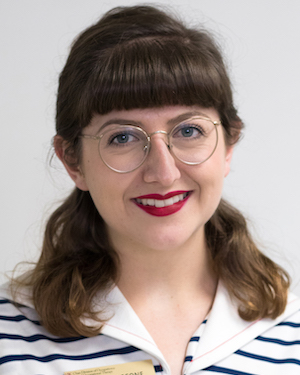
Five ways to make the OTD more affordable ⟩
January 23, 2019, by Antonietta
Admissions Life Hacks
Like I mentioned in my previous blog Choosing a Residency Site, off the bat it seems like a USC affiliate site is the best financial package and the whole prospect of affording the OTD without it seems impossible. I’m here to tell you that is not the case! Yes, the OTD at USC is expensive but here are five steps I took to make it more affordable:
- The most direct one was finding a residency site that hired me on as an occupational therapist once I got my license. I looked at Glassdoor to get a sense of what entry level pay was like and mine is a few dollars lower because of the mentorship and training that I receive. I can cover about 50% of my Fall/Spring tuition (before any scholarship) by completing 20 hours of residency work per week. This percentage will change over the summer when I’m working full time at my residencies.
- The next one was a question of weighing pros and cons. First the background: in the Master’s you pay a flat rate for 18 units of tuition and for the Doctorate you pay for each unit you take. During the Fall and Spring of the second year of the Master’s you are not required to take the full 18 units and there are opportunities where you could be. In the Fall, you can do Directed Research (OT 590) for 2 units and during the Spring you can load up on elective credits to reach the full 18. Elective credits taken during the Master’s carry over to the Doctorate and if you do the max units both semester you do not need to take any elective during the OTD. This saves you up to 4 units at approximately $1800 per unit. I found 18 units manageable but it was noticeably more work than my classmates who were not doing it . . . so consider that as you plan your semester!
- There are some paid positions in the Division available only to OTD students. I am the classroom assistant for two courses. Since the professors know that you are also a student in an intensive course of study, I have found they are easy to work with and I can adjust my schedule to manage both these positions and my doctoral work. I personally enjoy being connected back to the Master’s program and working with professors that I was inspired by when I was in their classrooms.
- Keeping my grades up! There is scholarship from the Division for the OTD based on academic achievement. This includes GPA as well as participation and impact in the Division during the Master’s.
- Finally, I’ve known since I started the program that I wanted to pursue the OTD, so I did some things to prepare for the expense including working during the Master’s. I picked up 5-7 hours per week and it helped cut down on my expenses during the Master’s which made taking on the financial burden of the additional OTD year slightly less intimidating.
I’m not going to talk about loans or scholarship because it is very similar to the Master’s. There have been some great Ambassador blog posts written about these topics in the past so definitely check those out. I hope that sharing this part of my OTD experience demonstrates that there are ways to make the OTD work financially and for me, it has been worth every penny.
⋯
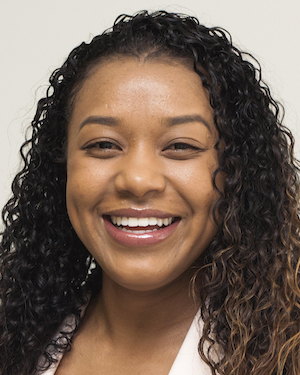
Spring Schedule: Balancing Class, Work, Extracurriculars ⟩
January 22, 2019, by Serena
Life Hacks School/Life Balance
This semester is my last academic semester as an OT Master’s student! The program went by so quickly. Feels like yesterday that I was at the 2017 newly admitted student reception.
In the last semester of the Entry Level Master’s Program, you are required to take a Leadership Capstone and Advanced Seminar in Occupational Science course to hone in on the foundations of OT and OS and what it means to be a leader in the field.
Additionally, you will be given the ability to select from a wide range of of electives where you can focus more on your specific areas of interest such as health and wellness, sensory integration, Spanish medical terminology, acute rehab, hand rehabilitation, motor control, and the list goes on and on. Since my passion is health promotion, behavior change, and lifestyle interventions, I have decided to enroll in Current Applications of Lifestyle Redesign, Optimal Living with Multiple Sclerosis, Therapeutic Communication, and Occupational Therapy in Primary Health Care Environments.
Besides course work, within the USC Chan division I will continue to serve as a Care Team Coordinator for the Student Run Clinic (SRC), and as a member of the Diversity, Access, and Equity (DAE) Committee. Outside the division I will continue to practice yoga, hike, and uphold my role as a member of the American College of Lifestyle Medicine (ACLM) organization working on the behavior change sub-committee.
Balancing all of my passions and interests can be a challenge at times so what do I do to manage? I participate in a lot of energy restoring activities (e.g., yoga, hiking, meditation) and make sure that all of my extracurriculars are things that I genuinely enjoy and love doing. While in the program there are many ways that you can receive help balancing the two. For instance, the professors embed assignments that focus on helping you achieve a more balanced and healthy life. In addition, there are services (some of which are free) that you can receive as a student where you can get one-on-one attention with an OT who specializes in helping you stay balanced: USC Kortschak Center for Learning and Creativity (KCLC) and the Occupational Therapy Faculty Practice (OTFP).
If any of these courses, extracurriculars, or services interest you, please reach out to me and I would love to tell you more about them or answer any questions you may have.
Schedule of my typical week as a USC OT student in the last academic semester of the Entry-Level Master’s program
⋯
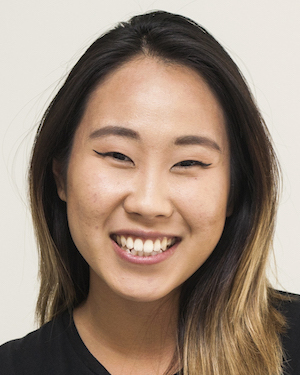
Can I do Grad School? ⟩
December 4, 2018, by Joyce
Life Hacks What are OS/OT?
This was a big question that I find many people asking themselves. Whether you’re contemplating graduate school right after undergrad or going back after years of not studying, it seems to be a daunting choice to give up a salary to study full time.
Grad school is truly unique in its own way, way more so than undergrad ever was. From simply a developmental perspective, we are still finding ourselves in undergrad . . . our identity, who we are and what we want to be. However, in grad school you’re one step closer to consolidating the path in which you want to embark on.
Personally, I struggled a lot with low self esteem in college, shape shifting to match the peers around me and truly plagued with the disease to please. It wasn’t until senior year of college where I found comfort in being myself. Chasing after OT only reaffirmed the comfort I found within myself which is why I decided to pursue grad school immediately. I did not want to take a gap year because I was so sure on pursuing OT that I did not want to wait any longer. In that way, because I was used to the flow of school, exams, and papers . . . academically it wasn’t a difficult transition. That being said, it wasn’t an easy social transition. I had to pick up everything I had on the east coast and move to the other side of the country. I was couch hopping the first couple of weeks. I had a two week break between the day of my undergraduate graduation and the beginning of the graduate program. I definitely found myself burnt out many times and questioned whether this was the right choice I made.
But I am a firm believer of finishing what you started. Grad school was daunting at first. You meet many students who are just as passionate as you – which can be inspirational or scary. It is a game of perspective, will you view them as peers to learn from or simply competition to hide from? What’s great about OT school is that the program begins with our faculty encouraging us to learn from each other, to use each other to expand and challenge our clinical reasoning. Reflecting now, I’m glad that I made the choice to come to USC when I did because it gave me the opportunity to make life-long friends and receive strong mentorship with many of the faculty that went through the program themselves.
If you’re hesitating on applying to grad school, I would start with reflecting on why. Is it fear? Fear of school or fear of starting something new? One thing that is for sure is that no one goes through grad school alone, we do it with the support of our friends, professors, and social support!
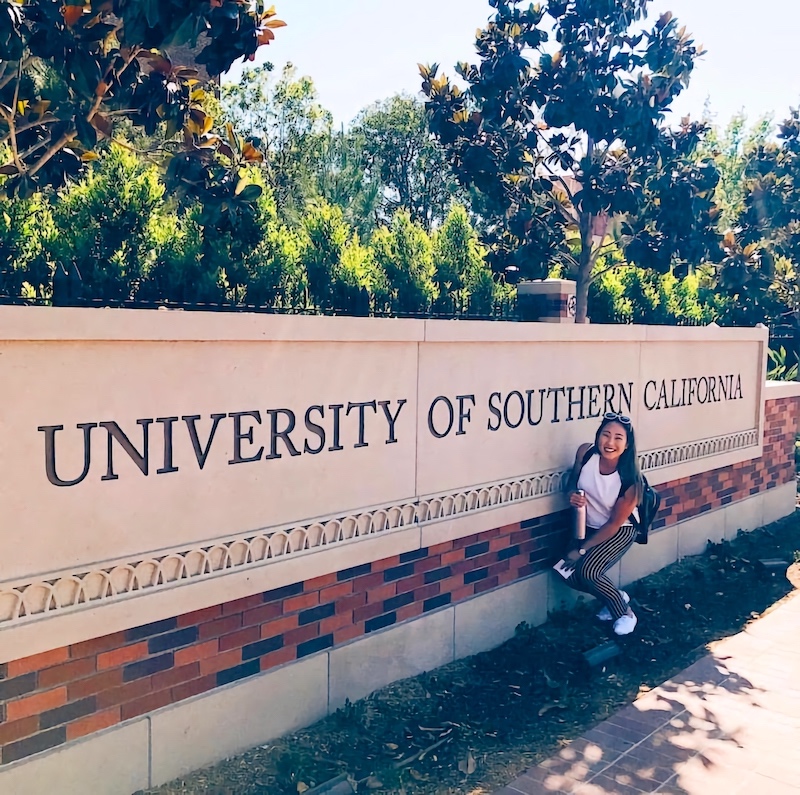
⋯
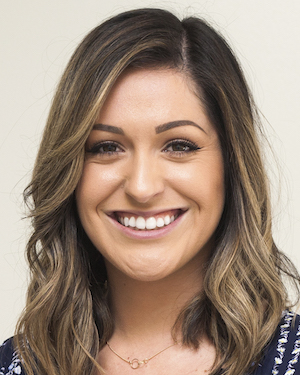
Preparing For Finals ⟩
December 3, 2018, by Melissa
Life Hacks
Hey everyone! This semester is quickly coming to an end and I’m in the process of preparing for finals. It’s both an exhausting time and an exciting time, as I am so close to the end of the semester, but I have to get through finals first! Being at this stage made me want to write a bit about my approach to finals, especially with work being factored into my schedule.
First and foremost, organization is KEY. I like to look ahead at my work calendars so that I can schedule different sessions for studying when I’m not in class or at work. I also like to get together with my classmates to study in a group so that they can help keep me accountable. Otherwise, I get sucked into a Netflix binge session that is no good for anyone. Living in downtown also gives me access to lots of cute coffee shops that have great coffee and a cozy ambience that helps me stay focused.

Hazelnut Latte from Loit Cafe in Downtown LA
Don’t get me wrong though, finding the motivation to push through to the end of the semester is hard. Senioritis is REAL, and I’m very tired. But that’s why it’s so important to have a good support system, both inside and the outside of the program. I have such a great group of classmates that I’ve met in the program that offer constant support and motivation, and my family and friends outside of the program help me unwind and enjoy the little free time that I have.
Fortunately, I know that I’ll get through this, just as I have gotten through every other set of finals in my academic career. Just stay strong, push through, and remember why you started.
Good luck to everyone going into finals this semester, and fight on!
⋯






